| Article ID | Journal | Published Year | Pages | File Type |
|---|---|---|---|---|
| 4259427 | Transplantation Proceedings | 2010 | 5 Pages |
ObjectiveTo investigate the effect of apolipoprotein E (ApoE) gene polymorphism on lipid metabolism among renal transplant recipients before and after transplantation. No prisoners or organs from prisoners were used in this study.MethodsApoE gene polymorphism was detected with polymerase chain reaction-restriction fragment length polymorphism; serum lipid levels were measured with biochemical methods.ResultsSerum lipid levels in the recipients were increased significantly at 3 months after renal transplantation, and further elevated at 6 months and 1 year. The recipients with higher total serum cholesterol (TC) and triglyceride (TG) levels only accounted for 2.9% and 7.6%, respectively, before renal transplantation; but for 28.6% and 46.7%, respectively, at 3 months (P < .01); 40.0% and 59.0% at 6 months; and 42.9% and 62.9% at 12 months. ApoE gene polymorphism showed no statistical difference in ApoE allele or ApoE genotype between the control and the study groups. The effect of ApoE genotype on serum lipid levels was different between controls and recipients either before or after renal transplantation. The levels of serum TC, TG, low-density lipoprotein cholesterol, ApoB, ApoE were: ε2/2+ε2/3; ε3/3; ε3/4+ε4/4 from low to high in controls and recipients before transplantation, but the levels of TG and ApoE reversed among recipients after renal transplantation.ConclusionRenal transplant recipients are liable to develop hyperlipidemia, particularly hypertriglyceridemia among recipients with ApoE genotypes ε2/2 or ε2/3.
